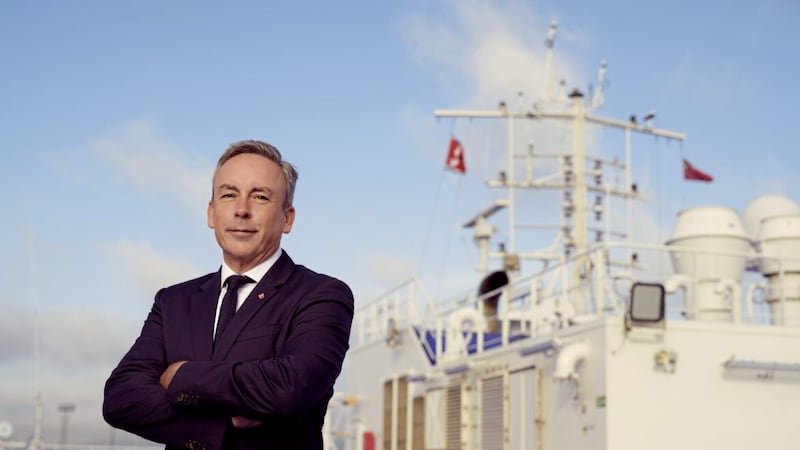PAUL Grant adores talking numbers. In most cases, big numbers.
As Irish Sea trade director for Stena Line, which is part of the family-owned Stena AB Group, founded in 1962 and headquartered in Gothenburg, he has been front and centre of a phenomenal growth phase within the ferry operator, particularly over the last decade, interrupted only by Covid in 2020.
"Yes, Covid was a massive setback. It wasn't easy running ferries with nobody on board except the crew. But people have to eat, and it was our responsibility to ensure shops stayed open and supermarket shelves were filled," he says.
"We as a company have always been resilient, whether it was Covid or Brexit before it. And despite those transitions, we're through it and are continuing to invest," he adds.
Paul has just marked 37 years with the company, and still functions with the same youthful exuberance than when he started in the early 1980s.
Back then, Stena operated on one route to Scotland, with three ships crossing between Larne and Stranraer.
Today, it runs seven Irish Sea ferry routes north and south. Stena Line moved to Belfast in 1995, and since then, the city has established itself as Stena Line’s largest European business hub.
"We've invested £500 million in Belfast in terms of tonnage, infrastructure and ships. We've 12 vessels on Irish Sea routes daily, and we've got two more ships coming in the next couple of years. We're constantly investing and constantly growing."
Stena is currently constructing two new bespoke freight ferries for its expanding Belfast-Heysham freight service. Each of the new 147-metre vessels has been designed to maximise freight volumes and will provide 2,800 lane metres of capacity, which is an 80% increase on current ship capacities.
The new vessels, the first of which is due to enter service on the route in autumn 2025, will be equipped to carry 12 passengers and 26 crew.
"The ‘NewMax’ vessels will be able to operate on methanol fuel, and future-proofing them for electrification will also be another priority during construction, providing in-built technologies that can take advantage of both battery propulsion and shore power, where this is available," says Paul.
He concedes that oil and gas will continue to be shipping’s main fuels for many years to come, but says Stena is already a pioneer in using methanol, which has many environmental benefits, and it will be possible over the long term to produce it as a climate-neutral fuel with the potential to reduce carbon emissions by up to 95%.
Such is the growth trajectory on which Stena is currently operating on the Irish Sea under Paul's watch that it is in tender for a new service between Dublin and Birkenhead, replacing the P&O service which ceased operations earlier this year.
And while it's likely Stena will be up against rivals Seatruck and Irish Ferries in that tender process, Paul insists: "We feel best-placed to take over, as we already have an operation in Birkenhead."
A decision is likely in the coming weeks, as P&O comes off the service from the end of December.
Back to talking numbers, Paul boasts that this year Stena has carried 590,000 of freight units from Belfast, which is nearly 70% of all the freight that moved between Northern Ireland and Britain.
"We've also carried 485,000 vehicles, which is 80% all the cars that go back and forth, and around 1.6 million passengers - which is almost the equivalent of the entire population of this place."
Interestingly, he also points to Stena now operating "one of Belfast's busiest hotels".
"That comes with the whole quality of experience on the Belfast to Liverpool route since we put on the new ships when we took over the service in 2013," he says.
"We've doubled in terms of its tourism volumes - more cabins for people at nights and more capacity. People love the whole idea of getting on a ship and waking up the next morning at their destination.
"We've 175 cabins on that ship and they're full virtually every night. We have to turn those cabins over twice a day, so it's really hard work for guys on the ship. But we must deliver quality".
Paul speaks glowingly of the Stena "father figure" in owner Dan Sten Olsson (76), who gave the keynote address at a ‘Care for each other and the future’ conference in Belfast earlier this year.
"His relationship with Northern Ireland goes back to 1972, when his father had chartered a ship to someone and Mr Olsson came over to see it, during the height of the troubles.
"He's had an affinity with Northern Ireland and Belfast ever since. He genuinely believes in this place and continues to invest. And when you look at what we've done as a business, it's primarily down to his investing."
But not everything has changed for the better in Paul Grant's near four decades with Stena.
"We've done our part in investing half a billion pounds on building ports and bringing on new ships. But wouldn't it be lovely to see an improved roads infrastructure?
"The Westlink on this side and A75 on the Scottish side continue to be a barrier to trade.
"People talk about sustainability.But these are main arterial routes for freight between Ireland and the UK, yet nothing is ever done to bring about the improvements. It's never been a priority - and right now it should."







